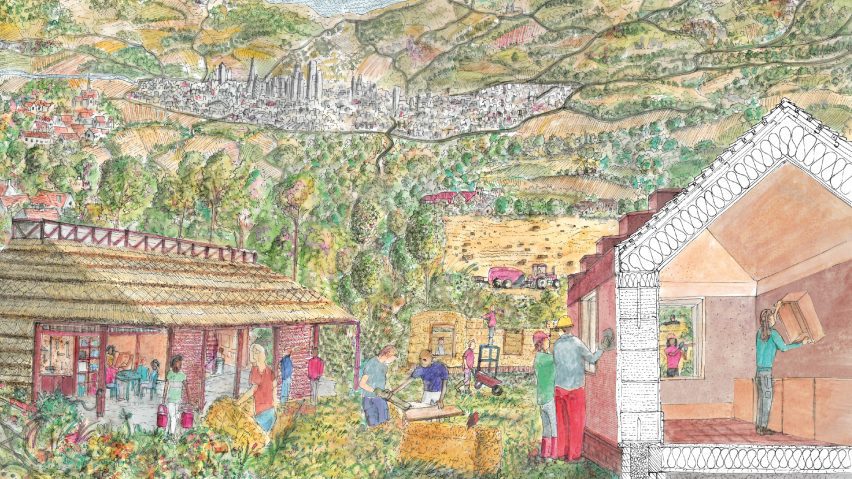Improving the standards of temporary homeless accommodation and addressing the needs of care leavers are among the issues tackled by the three finalists of the annual Davidson Prize.
Launched in 2021 in memory of architectural visualiser Alan Davidson and now in its third year, The Davidson Prize is a design ideas competition that explores the ever-changing concept of the home.
This year's three finalists, chosen from a longlist of projects by 16 studios, are Helping Hands by architecture practices Studio Mutt and Neighbourhood, Home Building by interdisciplinary research group Wild and the School of Natural Building (SNaB) and More Not Less by design collective Re-Group.
Each project responds to the theme Somewhere to Call Home and a brief calling for "new kinds of home communities" for people who have experienced housing insecurity.
Many of the teams' collaborators have first-hand experience of the issues that their projects address.
Helping Hands is a proposal for a "nurturing" communal landscape in Liverpool. It champions community support and is designed for care leavers – adults who have spent time in care.
Studio Mutt and Neighbourhood developed the project with a varied team of local residents, artists and specialist support organisations.
These include The Independence Initiative, Islington Hostel Outreach, Hugh Baird College, filmmaker Amber Akaunu, accessibility consultant Peter O'Neil and Liverpool-based Dead Good Poets Society.
Architect James Houston of Wild worked with SNaB to create Home Building, a proposal for a 12-month design and construction course. It is aimed at groups including teenagers leaving care, ex-prisoners and asylum seekers over the age of 16.
The programme, which focuses specifically on sustainable building methods, is designed with the intention of assembling groups from diverse backgrounds and providing them with a sense of belonging.
According to the team, it would also offer "participants a real stake in the places they live".
The third finalist, More Not Less, was created by the collective Re-Group. The team includes ZCD Architects, Madeleine Kessler Architecture, journalist Datshiane Navanayagam, Architecture Doing Place, JCLA, Webb Yates Engineers and trauma therapist-in-training Charles Jegar.
It is a proposal to improve the standards of temporary homeless accommodation by focusing on design codes. The project tests its principles on a site on Kingsland Road in London's Hackney borough.
This year, the competition jury panel features architects Sadie Morgan and Charles Holland. Holland was the recipient of the Davidson Prize in 2022.
Also included in the group is the Design Museum's head of curatorial and interpretation Priya Khanchandani, homelessness charity Shelter's director of policy, campaigns and communications Osama Bhutta and Enfield Council senior development manager Yemí Aládérun.
"This is a terrifically strong shortlist with proposals addressing a wide range of issues around homelessness, geographic and cultural contexts and ways that architecture can help to address them," said Holland.
"The teams also include people from many different disciplines, recognising that responses need to address policy, care and economics as much as architecture," added the architect.
For the prize's last stage, each finalist will be given £5,000 to develop their ideas and create a visual media presentation for the judges.
The Davidson Prize will announce its winner at the London Festival of Architecture in June, and grant the winning project £10,000 as a result.
A People's Choice Award will also be revealed at the ceremony.
Architectural visualiser Davidson passed away in 2018 from motor neurone disease (MND), aged 58. Before he died, Davidson set up the Alan Davidson Foundation, a charity designed to support people who are affected by MND and other associated neurological conditions.
The images are courtesy of The Davidson Prize.

